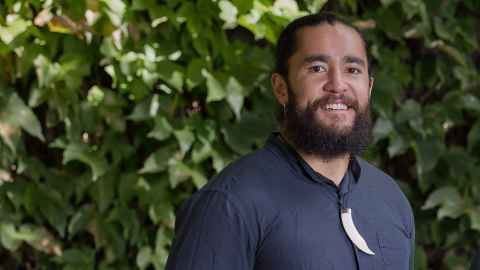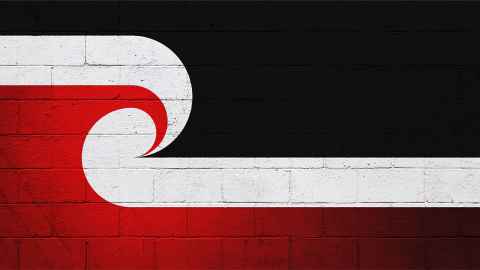Making mokopuna decisions
17 June 2024
Eru Kapa-Kingi reflects on recent action in te ao Māori, including the nationwide strikes to assert the mana of Te Tiriti and protect the rights of mokopuna.

Opinion: There is nothing more unifying among te iwi Māori than the dreams and aspirations we hold for our mokopuna. Their future livelihoods are our common destination.
For me, making mokopuna decisions is the driving force behind recent action in te ao Māori: our national day of activation on 30 May, the hui ā-motu being led by the Kiingitanga, and the launch of our concept for a Māori parliament.
It seemed as if the mainstream media played down the turnout by tangata whenua and tangata Tiriti on the day of activation. There were reports of a couple of thousand here and there. But there were enough Māori revolutionaries with cameras at the more than 40 locations to scorch the truth across social media: by my reckoning, over 100,000 turned up on that day. With just three days’ notice, those thousands responded to the call of Toitū Te Tiriti, and they responded in the name of making good decisions for our mokopuna.
It was no coincidence that our national activation day converged with the release of statistics revealing the population of te iwi Māori in Aotearoa has reached nearly one million. So much for the 19th-century theory from Pākehā that they would merely “smooth the pillow of a dying race.” Te iwi Māori is clearly growing, both in number and political strength, and we are not going anywhere.

In Pōneke on the day of activation, I gazed at the mokopuna faces which energise us, while surrounded by mātua and kaumātua. I could not help but shed tears of pride. Our people had turned up bearing the magical grace of our tūpuna. After more than 180 years of being told we are less than, still we walk like giants, and still we nurture the belief and conviction that we have a right to freedom. Freedom means not merely the absence of physical shackles, but the freedom to wholly be ourselves on our own whenua. What I witnessed on the day of activation was a platform for rangatira revolution.
The number of Pākehā who showed up to support us is proof there are those who also want to transform and belong to something greater than themselves. Ka mihi rā.
Some Pākehā do remain fearful of what Māori liberation might mean for them, so I think it’s important to reiterate that the realisation of rangatiratanga will never create Pākehā oppression.
The measure of a rangatira in te ao Māori is one’s strength to feed and house all peoples within your domain. An example is Te Pahi, rangatira of Ngāpuhi. While on his travels to London in 1791, Te Pahi and his contemporaries could not believe their eyes when they saw widespread poverty while some lived in lavish castles and claimed to be leaders of their people. Many impoversished Pākehā who subsequently came to Aotearoa, following James Cook’s map in the 1800s, survived purely on the manaakitanga of tūpuna Māori.
This is what was envisaged in Te Tiriti o Waitangi: the protection of mana Māori while creating a world of balance. Te Tiriti can be, and should be, a source of identity for all Pākehā and tauiwi in Aotearoa.
Before our day of activation, there were patronising and racist assumptions from political leaders that the strike and rally actions would be “illegal”. That’s an ironic accusation from an institution built on the lie that Māori signed away their power to the Crown in 1840. The resulting Pākehā government has been illegal since it was first imposed on tangata whenua in 1853.
There was further issue with our use of the word “strike”, as if there is a monopoly over the language of liberation. If you claim to own the words of freedom, and deny them to others, you are, of course, feeding oppression. The entire point of the action was to stand in our truth: that we are sovereign in Aotearoa.
Heoi anō, it’s worth remembering the journey of our tūpuna from Hawaiki to Aotearoa was not an easy one. I’m fairly sure my tupuna Kupe and other captains of the first voyaging fleets from Eastern Polynesia into the depths of the South Pacific would have copped some criticism in the homeland before they began their journeys.
The landing point for our national activation was Te Ngākau o Te Iwi Māori — a call for te iwi Māori to create our own parliament, anchored in our tikanga and kawa, focused entirely on mokopuna livelihoods — and established as part of transforming Aotearoa into a nation which respects the tino rangatiratanga of tangata whenua, creating a safe home for all peoples.
Te Ngākau was announced by Rawiri Waititi, and fronted by Te Pāti Māori. At its core, Te Ngākau is an opportunity for all of Aotearoa, no matter what age, ethnicity or culture, to show tautoko towards an idea that could be transformational.
Te Ngākau has already started to attract some criticism, despite the fact Māori parliaments have existed before, but in my view, the criticism is a good thing. We need to be able to freely debate subjects which may be considered radical.
One of the criticisms is that Te Ngākau was not created in consultation with te iwi Māori, and that it is not the role of any political party to be leading such a kaupapa.
In response, I would say that Te Ngākau has kick-started a conversation, shifting us away from defending ourselves against a constant barrage of attacks from the current government, and into a mode of empowerment.
These conversations are part of the necessary wānanga, which is simultaneously a consultative and developmental process. Our people have become disempowered and apolitical, and it will take time to shift away from these things. Heoi anō, the rebirth of Te Pāti Māori is truly focused on that movement and our mokopuna. Perhaps persistence will convince our people of this.

Tākuta Ferris, the MP for Te Tai Tonga, laid down Te Ngākau to his people at Te Hui Taumata in Ōmāhu, the day after the national activation. It was his contribution to the wānanga of rangatiratanga. There was a fair criticism from my whaea Annette Sykes in her response. Her kōrero said that the coloniser’s tools cannot be used to take down the coloniser’s house.
But the generation leading this movement would never let a label reshape their ngākau Māori into an object of oppression — and it was Whaea Annette’s generation who made that a reality for us. Her generation fought for our reo, culture, and freedom, and now we can walk without fear into any space available and make it our own. At the same time, Pāpā Moana Jackson was also right in saying that those who hold political power will never be agents of change — that is the role of the people.
Erangi rā, I move forward in the belief that whakapapa and a common commitment to free ourselves binds us together in a movement which is much larger than any person, group, label or house. We all make up the kaupapa, and no single person is above or below.
In a recent hui, Poia Rewi spoke of “Hawaiki Mokopuna”. In my mind, this kōrero paints a picture of a utopian land where all mokopuna Māori know freedom for themselves, and can enjoy the vivacity of oranga.
Everyone has their own map to get there, but I think we all agree that Hawaiki Mokopuna is our destination. We agree that our current reality as tangata whenua is unacceptable and there is a better way out there for us. There is a future where our mokopuna know freedom more intimately than we ever could. And I think there comes a time when we must courageously launch our waka toward that future and adjust our course on the way.
All it takes is a moment of belief in our role as the waka-launching generation. We must disempower fear, guard our ability to imagine and dream, and then believe the dream with all that is in our ngākau. The only thing we should fear is inaction.
We’ve got this, e te iwi. Ki te hoe!
By Eru Kapa-Kingi, teaching fellow at the Law School of Waipapa Taumata Rau University of Auckland, with a focus on Te Tiriti, public law and intersections with tikanga Māori.
He is also a graduate of Te Panekiretanga o Te Reo and has taught te reo in full-immersion environments. He advocates for political change in his roles as lead and co-founder of Toitū Te Tiriti, Vice-President Tāne and advisor for Te Pāti Māori.
This piece was first published by e-tangata. The opinions are those of the author and not necessarily the University of Auckland.
Media contact:
Sophie Boladeras I Media adviser
M: 022 4600 388
E: sophie.boladeras@auckland.ac.nz